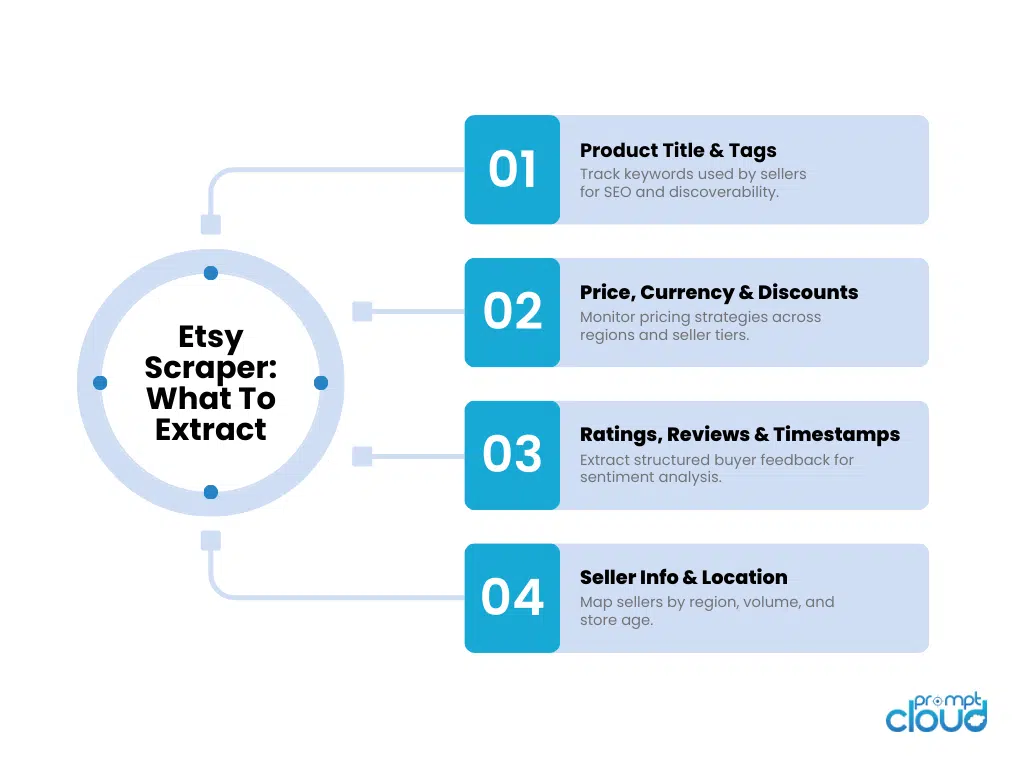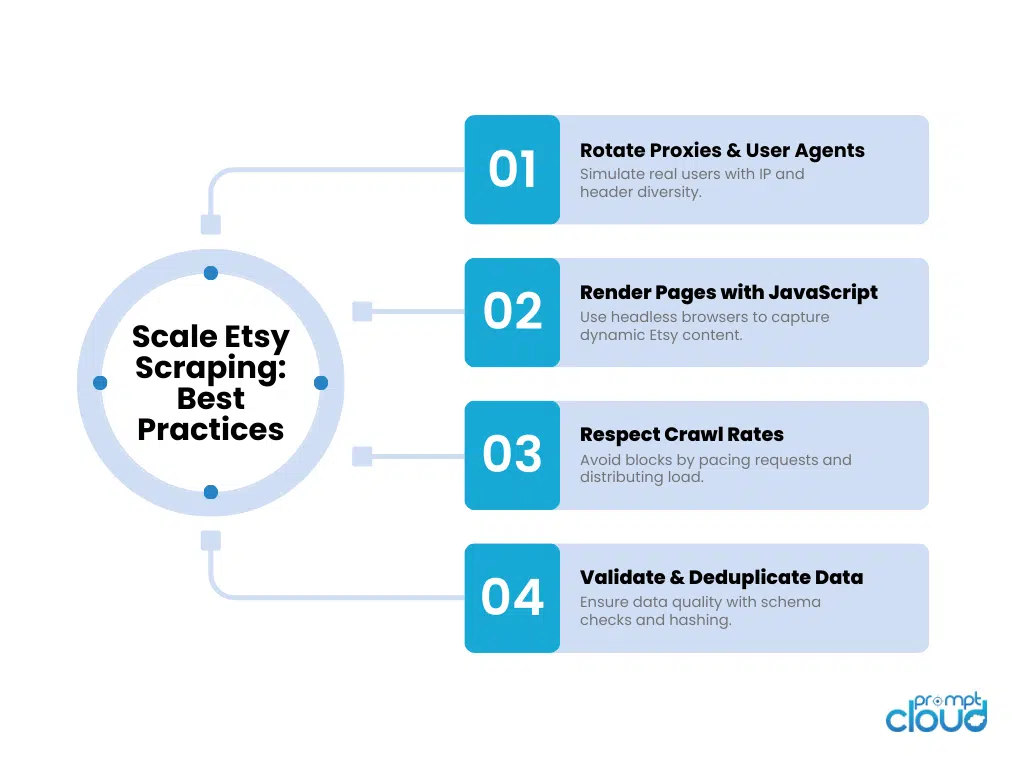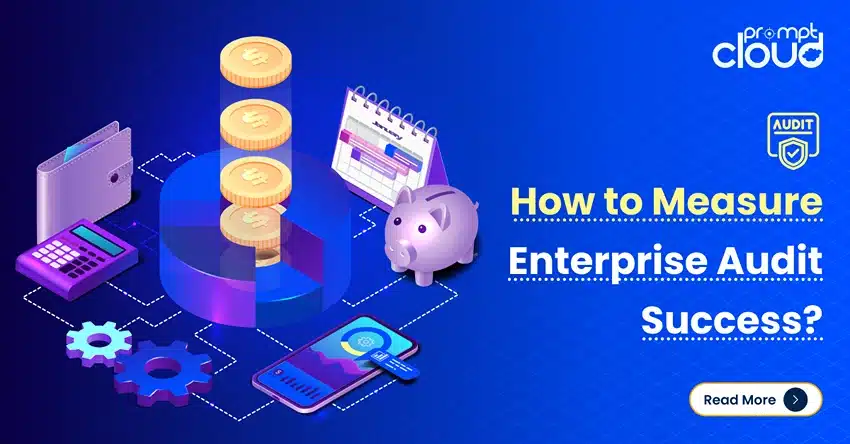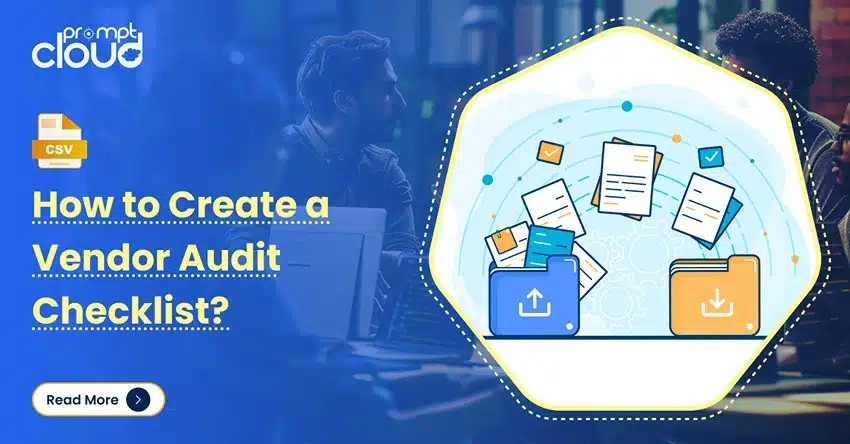
**TL;DR** If you need structured Etsy data—trending products, live prices, or what buyers actually say in reviews—use a professional Etsy scraper. A small Python script is fine for a one‑off pull, but production work is a different game. You’ll need a stack that renders dynamic pages, rotates IPs, slips past anti‑bot checks, and keeps the output in a consistent schema every single run.
This guide walks through the data you can pull from Etsy, the gotchas that trip teams up, the practices that keep pipelines healthy, and where a managed partner like PromptCloud saves weeks of engineering time.
Why Businesses Scrape Etsy Data
Etsy isn’t just a shop window. It’s an early signal of what people want—often months before big-box retailers catch on. For D2C brands, resellers, analysts, and marketers, it’s a live stream of pricing moves, search tags, breakout sellers, seasonal spikes, and shifting sentiment.
Scraping Etsy helps you move first. Spot fast‑moving SKUs. Compare prices across similar handmade items. Study descriptions and titles that actually convert. A solid etsy scraper turns noisy pages into clean, structured rows you can trust.
The real edge: Etsy surfaces niche demand before it goes mainstream. Today’s scraped fields can shape tomorrow’s product roadmap, ad copy, and inventory bets.
What Data Points on Etsy Are Valuable?
The power of Etsy scraping lies in granularity. Here’s what businesses typically extract:
| Data Point | What It Tells You | Common Use Case |
| Product Title | What keywords sellers are using | SEO, competitive listing copy |
| Price & Currency | Market price benchmarks | Pricing intelligence, cost competitiveness |
| Product Tags | What attributes customers search for | Trend analysis, SEO strategy |
| Description | Selling points and USPs | Copywriting inspiration, keyword mining |
| Ratings & Reviews | Customer sentiment, satisfaction drivers | Review sentiment analysis |
| Category/Subcategory | Market segmentation | Category-specific product performance |
| Stock/Availability | Demand signals, inventory movement | Replenishment cycles, sales forecasting |
| Seller Info | Location, number of products, ratings | Competitor mapping, seller tracking |
| Shipping Time/Price | Delivery trends by region or seller type | Fulfillment strategy, logistics insights |
Whether you’re building dashboards for product intelligence or feeding raw data into pricing engines, these fields form the backbone of Etsy data analysis.
Want expert-built scraping support?
Want reliable, structured Temu data without worrying about scraper breakage or noisy signals? Talk to our team and see how PromptCloud delivers production-ready ecommerce intelligence at scale.
Etsy Scraping Isn’t Simple—Here’s Why
Etsy’s JavaScript-Heavy Frontend
Key details—dynamic prices, shipping estimates, reviews, product variations—often load client‑side. If your etsy scraper only fetches static HTML (e.g., basic requests/BeautifulSoup), you’ll miss half the page. Headless tooling like Playwright or Puppeteer solves that, but introduces real engineering work: scaling browsers, handling timeouts, retry logic, and keeping latency under control.
Frequent Layout and URL Structure Changes
Etsy frequently updates its frontend components, class names, and page layouts to improve user experience. That’s great for shoppers—but it breaks rigid scraping scripts.
If your scraper is tightly bound to CSS selectors or fragile XPaths, expect breakage every few weeks. A production-grade scraper etsy setup must include a change detection layer, fallback selectors, and monitoring for schema mismatches.
Anti-Bot Systems and Rate Limits
While Etsy doesn’t make its listings private, it actively detects suspicious behavior:
- Repeated requests from the same IP
- Sudden jumps across product pages
- Missing cookies or inconsistent headers
Etsy Scraper Options: DIY vs Professional Services
Scraping Etsy listings, reviews, and seller metadata requires infrastructure—not just code.
Etsy Scraper in Python: Useful Until It Isn’t
A script using requests, BeautifulSoup, or Playwright can get you basic Etsy data. But as soon as JavaScript rendering, proxy rotation, fingerprinting, and change monitoring enter the picture, things fall apart. Engineers end up firefighting layout changes and blocked sessions instead of generating insights.
Related: Building Custom Scraping Tools with Python
DIY fits early experiments. Beyond that, it’s a maintenance trap.
No-Code Scrapers for Etsy: Visually Easy, Operationally Weak
Point-and-click scrapers promise simplicity. But Etsy’s frontend complexity and bot detection quickly reveal their limits. Most lack robust retry logic, field-level QA, or fallback selectors. Export quality is inconsistent. When you need predictable, structured output delivered on time, these tools don’t keep up.
They also lack key operational safeguards—no alerts when selectors break, no deduplication, and no audit logs. If Etsy data feeds core reporting or ML input, those gaps cost more than you think.
Also Read: Top 10 Traps to Avoid When Scraping News Aggregators
Professional Scraping Services: Built for Scale, Not Just Speed
A managed etsy scraper service handles everything: dynamic rendering, IP rotation, bot evasion, session handling, schema mapping, QA, deduplication, and delivery in your format of choice (CSV, JSON, S3, or Sheets). You don’t waste time coding or debugging—just define the data you need and get it on schedule.
PromptCloud, for example, delivers structured Etsy data with:
- Headless browser rendering for JavaScript-heavy pages
- Residential and ISP-based proxy rotation
- Built-in validation, deduplication, and schema enforcement
- Format and frequency control: hourly, daily, weekly
- SLA-backed delivery and compliance-first workflows
This model isn’t just more stable—it’s faster to onboard, easier to scale, and de-risks your data pipeline. If Etsy data is mission-critical, don’t duct-tape a crawler. Let engineers focus on insights—not infrastructure.
What You Can Extract with a Professional Etsy Scraper
Scraping Etsy isn’t about collecting everything—it’s about getting exactly what you need, in a structure that works across teams. A professional etsy scraper gives you control over fields, format, delivery cadence, and data quality from day one.
Whether you’re feeding product analytics, pricing engines, sentiment models, or dashboards, here’s what clean Etsy data looks like at scale:
Etsy Data Fields and Their Applications
| Field | What It Captures | Why It Matters |
| Product Title | Seller-optimized product name | Keyword analysis, SEO benchmarking |
| Product Tags | Tags assigned by the seller | Attribute trends, category clustering |
| Product Description | Detailed copy written by seller | Content analysis, messaging research |
| Price & Currency | Displayed price and currency symbol | Price tracking, dynamic pricing models |
| Review Count & Rating | Total reviews and average star rating | Sentiment tracking, trust score modeling |
| Individual Reviews | Customer review text + timestamps | Sentiment analysis, feedback loops |
| Stock & Availability | In-stock, out-of-stock, or limited-quantity flags | Demand signals, inventory benchmarking |
| Seller Location | Region of the shop owner | Geo-level segmentation |
| Shop URL & Name | Storefront metadata | Seller profiling, competitive mapping |
| Category/Subcategory | Etsy’s taxonomy for each listing | Vertical targeting, category performance |
| Shipping Details | Shipping cost, delivery time estimate | Fulfillment insights, cross-region logistics planning |
| Product Variants | Sizes, colors, options with separate SKUs | Product line analysis, variation trend mapping |
| Favorites Count | Total saves/bookmarks by Etsy users | Early demand signal, product virality scoring |

A structured scraper etsy setup can also extract seller ratings, badge types (e.g., Star Seller), and timestamps for trending velocity modeling. See how sentiment analysis on reviews works at scale → Beginner’s Guide to Review Sentiment Analysis for eCommerce.
When this data flows into your systems in clean JSON, schema-mapped CSV, or direct APIs, the output powers real decisions: launch timing, pricing updates, ad targeting, and product development. Unlike scraped blobs from DIY scripts or click-and-capture tools, this is analysis-ready data—delivered like infrastructure.
For ecommerce teams building dashboards, see: Top Web Scraping Applications – A Guide by PromptCloud.
Best Practices for Etsy Scraping at Scale
Here’s what separates scraping at scale from scraping for fun.
Use Rotating Proxies and Realistic Headers
Etsy throttles or blocks scrapers that reuse the same IP, skip cookies, or miss required headers. Use rotating residential or ISP-based proxies that simulate real devices. Rotate headers like User-Agent, Accept-Language, and referer strings. Cookie management is essential—some content won’t load without it.
Also Read: Top 10 Traps to Avoid When Scraping News Aggregators.
Respect Crawl Rates and Page Structures
Etsy doesn’t want you hammering its site every second—and neither do your proxies. Insert randomized delays (1.5–6 seconds), throttle frequency, and spread requests across product, review, and shop pages.
Avoid scraping every listing in a category. Instead, segment based on use case—top-selling items, new arrivals, high-review-count SKUs.
Implement Rendered Page Scraping
Many key fields on Etsy—like shipping estimates or review loading—appear only after JavaScript execution. Lightweight tools like requests will miss the data entirely.
In some cases, hidden APIs can be identified and leveraged for cleaner, faster fetches—if they exist and are within legal use bounds. Deep dive on rendering and scraping dynamic content — via Mozilla Developer Docs.
Validate, Deduplicate, and Monitor Continuously
Scraping at scale means data quality issues compound fast. Use hash-based deduplication on product URLs or listing IDs. Validate data against a defined schema—flag empty fields, data type mismatches, and character encoding issues.
Monitor scraper health: track crawl volume, field completeness, error rates, and freshness lags. When Etsy updates its frontend, you’ll know within minutes—not after a broken dashboard hits the VP’s inbox.

Why PromptCloud for Etsy Scraping
You can build your own Etsy scraper. You can rent tools. Or—you can get a full-stack, production-grade Etsy scraping pipeline that just works. PromptCloud is built for scale, compliance, and reliability. If Etsy data drives your competitive analysis, product decisions, or internal dashboards, here’s what that looks like when done right:
Structured Etsy Data with Full Stack Infrastructure
PromptCloud manages everything from anti-bot handling to schema-aligned output. That includes:
- JavaScript rendering for complete page capture (listings, variations, shipping, reviews)
- Rotating proxy management (residential, ISP, mobile) for low detection risk
- Browser fingerprinting control and session management
Change detection alerts to catch layout or field updates - Data validation and deduplication on every run
- Structured delivery in JSON, CSV, API, S3, Google Sheets, or custom formats
Whether you need hourly pricing data or weekly review sentiment across 10,000 Etsy products, this system handles the volume without flaking.
Compliance Built Into the Workflow
Web scraping isn’t just about access—it’s about risk management. PromptCloud enforces crawl delays, respects robots.txt and site terms, and avoids scraping login-gated or PII-rich data. We’re ISO/IEC 27001 certified, with clear logs, data sourcing transparency, and privacy-first practices designed for long-term compliance.
SLAs, Support, and Stability
If your scraper fails at 3 AM, it shouldn’t be your team fixing it. PromptCloud offers:
- SLA-backed delivery
- Field-level monitoring
- Automated retries
- Dedicated support managers
- Issue resolution without ticket queues
This isn’t “scraping as a tool”—it’s scraping as a data pipeline.
Sample Etsy Scraping Use Cases by Industry
Etsy isn’t just a craft marketplace. For the right teams, it’s a real-time feed of what’s trending, what’s selling, and how buyers feel. From ecommerce analysts to investment firms, here’s how different industries use a structured etsy scraper to drive smarter decisions.
Ecommerce & D2C Brands
- SEO + listing optimization: Analyze top-ranked listings in your category—copy, title structure, tags, and product descriptions that convert.
- Launch validation: Compare new product performance with existing benchmarks using early favorite/save counts, reviews, and rating velocity.
Market & Consumer Insight Teams
- Tag and theme clustering: Understand how sellers position similar products—what adjectives, materials, or niches dominate in each vertical.
- Sentiment analysis at scale: Use review scraping to surface emerging pain points, keyword sentiment shifts, or unmet expectations.
- Trendspotting: Surface fast-growing categories by tracking listings with increasing review count, seller badges, or saved item rates.
Investment & Product Research Teams
- Geographic signals: Map seller locations against popularity metrics to understand regional demand trends in real-time.
Retail Intelligence & Competitive Mapping
- Seller segmentation: Track top-performing Etsy shops across categories, fulfillment policies, and pricing models.
- Product duplication alerts: Spot similar or copied product designs by title similarity, tags, or shared imagery metadata.
- Shipping behavior analysis: Monitor delivery times, cost brackets, and region restrictions across competing sellers.
A well-built Etsy scraper isn’t just a tool—it’s an edge. The next section covers exactly how to protect that edge by avoiding the common pitfalls in Etsy scraping pipelines.
Etsy Data as a Signal for Product Validation and Early-Stage Investment
Etsy’s marketplace has quietly become a testing ground for new consumer product ideas—before they ever hit Amazon, DTC sites, or major retail. For analysts and investors looking to spot breakout brands or winning SKUs early, Etsy scraping is turning into a critical input for product validation and microbrand discovery.
Unlike Amazon or Walmart, where products are often backed by larger operations, Etsy surfaces first movers—products launched by small makers responding to niche or emerging consumer demand. Scraping listing metadata, save counts, review velocity, and restock patterns provides a unique lens into which products are gaining traction organically.
Take this example: a handmade skincare brand launches a charcoal clay mask on Etsy. Within weeks, the product shows a spike in saves, followed by rapid review accumulation and positive sentiment. By the time it expands to Amazon or its own DTC site, early indicators of product-market fit were already available through Etsy data.
This kind of pattern tracking across SKUs and sellers lets:
- Venture scouts discover fast-moving consumer microbrands
- Retail buyers identify SKUs worth onboarding
- DTC growth teams benchmark early traction signals before scaling
- Product developers validate positioning, copy, and price points based on real feedback
Scraped Etsy data also supports category whitespace analysis—revealing segments with low saturation but high engagement. For example, a spike in reviews and saves for “eco-friendly packaging” tags might signal readiness for adjacent product lines.
Signals like price experimentation, frequent variant updates, or seller expansion into new verticals can also indicate confidence from the maker—offering early cues to backers or strategists watching for scalable consumer plays. With a reliable Etsy scraper, this layer of market intelligence becomes actionable, fast, and replicable.
New‑Era Challenges & Tech Trends in Etsy Scraping
Etsy scraping isn’t just about avoiding bans and parsing HTML anymore. As of 2025, new legal precedents, privacy laws, and emerging scraping technologies are redefining what “professional” really means.
Legal & Compliance Frontiers
- Robots.txt as a binding document: Where once “robots.txt” requests were a courtesy, courts and regulators are treating them more like enforceable policy — especially in the EU under the Digital Services Act, and with GDPR / DPA regimes. Scrapers ignoring “disallow” paths risk being shut out or worse.
- Public data still has boundaries: Jurisdictions are asserting that even publicly visible data can violate privacy laws if scraped in bulk, misused, or if personal identifiers are included. Scrapers need provenance, consent logic, and explicit exclusion layers.
- Precedent cases reinforcing fair use / public data access: Cases like HiQ vs. LinkedIn reaffirm might allow scraping of public data, but legal risk still looms if login walls, paywalls, or terms violations are involved.
Technological Advances & Practice Innovations
- Computer Vision + Image Analysis: More teams are extracting insights not just from text (title, tags, reviews), but from product images: color palettes, design trends, visual similarity, even listing photos’ background setup. This amplifies sentiment, trend detection, and competitive design benchmarking.
- AI / ML‑assisted schema detection & selector stability: Rather than hardcoding selectors, new etsy scraper pipelines use machine learning to detect field boundaries, fallback selectors, and monitor drift automatically (e.g., when Etsy changes class names).
- Stealth / Reputation‑aware crawling: Scraping services are increasingly required to manage bot “reputation” — i.e., avoid being blacklisted by Cloudflare or similar anti‑scraping platforms by using realistic device emulation, consent for cookies, rotating user agents, safe request rates, and consistent header signatures.
FAQs
1. Is it legal to scrape Etsy data?
Yes—if done ethically. Public product and review data on Etsy can be scraped for business intelligence as long as privacy rules, terms of service, and robots.txt exclusions are respected. Professional scraping services like PromptCloud enforce these standards, ensuring compliant Etsy scraping at scale.
2. What’s the difference between a free Etsy scraper and a managed service?
A free or DIY Etsy scraper might work for one-time pulls, but breaks easily with layout changes, JavaScript rendering, or IP bans. A managed service handles everything: rotating proxies, session control, anti-bot handling, QA, schema consistency, and on-time delivery. It’s the difference between a script and a pipeline.
3. Can I scrape Etsy reviews for sentiment analysis?
Yes. A production-grade Etsy scraper can extract detailed review data including text, star ratings, timestamps, and even product variants. This data powers sentiment analysis, customer feedback loops, and product quality benchmarking across categories or competitors.
4. What delivery formats can I get with a professional scraper Etsy service?
PromptCloud supports JSON, CSV, Google Sheets, APIs, and cloud storage (S3, FTP, GCS). You define the structure and frequency. Data arrives clean, deduplicated, and ready to integrate into dashboards, BI tools, or ML workflows.
5. How fast can I start getting Etsy data with PromptCloud?
Most projects go live in days. Once requirements are locked, crawlers are configured, tested, and launched. From there, you receive Etsy data automatically, on your schedule, with full support and change monitoring built in
Want expert-built scraping support?
Want reliable, structured Temu data without worrying about scraper breakage or noisy signals? Talk to our team and see how PromptCloud delivers production-ready ecommerce intelligence at scale.



















